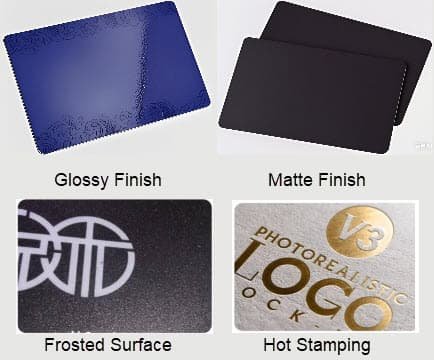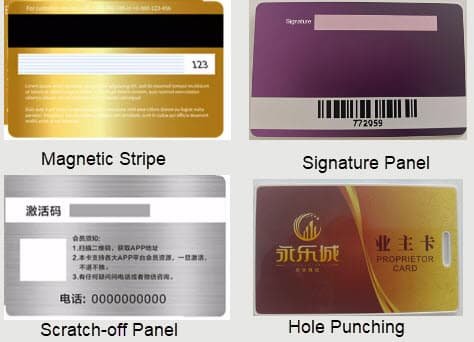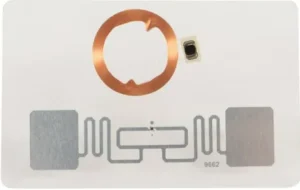NTAG 213/215/216 RFID Card
- Fully compatible with major NFC-enabled devices
- Available in three memory sizes: NTAG 213, NTAG 215, NTAG 216
- Fast contactless communication
- Advanced data protection
- Passive RFID technology with no battery needed
- Supports many applications: URL redirection, app triggers, digital business cards
NXP NTAG 213/215/216 RFID cards are NFC-compatible smart cards based on ISO/IEC 14443 Type A. They provide reliable communication, secure data protection, and flexible memory options, making them ideal for identity management, anti-counterfeiting, mobile interaction, and event access in both consumer and industrial applications.
- NFC Forum Type 2 Tag compliance
- 13.56 MHz operating frequency
- Memory options for various data needs
- Unique 7-byte UID for identification and tracking
- Anti-collision feature allows multiple tags in the field
- One-Time Programmable (OTP) pages
- Password protection and memory locking
- Supports app triggers, links, contact info, and more
Physical Characteristics
- SKU: Zeal-1012
- Material: PVC / PET / Eco-materials / More
- Size: CR80 (85.6 x 53.98 mm)
- Thickness: 0.84 mm (standard) or customizable
- Finish: Glossy / matte; supports offset, laser, or silk-printing
RFID Core Technology
- Chip: NTAG 213 / 215 / 216
- Protocol: ISO/IEC 14443 Type A
- Frequency: 13.56 MHz
- Data rate: 106 kbit/s
- UID: 7-byte unique identifier
- Memory:
- NTAG 213: 144 bytes
- NTAG 215: 504 bytes
- NTAG 216: 888 bytes
- Compatibility: Android / iOS NFC phones
Performance & Security
- Reading distance: Up to 10 cm
- Write endurance: >100,000 cycles
- Data retention: Over 10 years
- Security:
- 32-bit password authentication
- Lockable memory pages
- Originality signature for authenticity
- Anti-clone and tamper features
Environmental & Durability
- Operating temperature: -25°C to +70°C
- Storage temperature: -40°C to +85°C
- Durability: Waterproof, static-resistant, and long-lasting
Packaging & Order Info
- MOQ: 500 pcs
- Standard Packing: 200 pcs/box, 1000–5000 pcs/carton
- Lead Time: 3–7 days (sample), 7–20 days (bulk)
Please Note: Customization options may vary slightly depending on the card material. If you can’t find what you want from the following option, feel free to contact us and let us know your needs. We’ll get back to you ASAP after confirming with our engineers. And we will do our utmost to customize the card you desire.
Printing Method
Here are 3 professional printing techniques to bring your designs to life.- Silkscreen Printing: ideal for printing logos and icons. The colors are pure and it is suitable for projects that require bright colors, large areas of solid color, and high-contrast patterns.
- UV Printing: Bright colors, scratch-resistant, suitable for complex patterns and multi-color printing.
- Offset Printing:High color reproduction accuracy, suitable for complex multi-color designs.
Surface Finishes
We provide the following surface finishes to cater to different branding styles.
- Glossy Finish: Surface is smooth and shiny, with rich and bright colors.
- Matte Finish: Soft and non-reflective, with a premium touch.
- Frosted Surface: Similar to frosted glass, it is anti-slip and anti-fingerprint.
- Spot UV: Glossy coating on selected areas for emphasis and visual contrast.
- Hot Stamping (Gold/Silver): Shiny metallic effect, enhancing card’s texture and brand equity.
Functional Add-ons
Improve usability with functional features to match your application needs.
- Magnetic Stripe: Commonly used for access control, membership, or payment systems.
- Signature Panel: Ideal for cards requiring a signature space, such as staff or banking cards.
- Scratch-off Panel: Covers PINs or promotional codes for privacy and marketing.
- Hole Punch: Allows easy attachment to lanyards or clips, useful for ID badges.
Security & Personalization
Enhance brand exclusivity and anti-counterfeiting features for premium applications.
- Variable QR Code / Barcode: Custom unique codes for access, tracking, marketing, loyalty programs, etc.
- Serial / Embossed Numbers: Unique serial number per card, variable data.
- Laser Engraving Number: Non-erasable, enhance anti-counterfeiting level.
- Hologram: Enhance brand trust and provide strong anti-counterfeiting protection.
Custom Size
Besides standard CR80 cards (85.5×54mm), we also allow you to customize the shapes, thickness (0.2 – 0.8mm), and dimensions according to project needs.Custom RFID Chip
Choose the RFID chips by protocol, capacity, and functionality. We have chip with LF (125KHz), HF (13.56MHz), and UHF (860–960MHz) frequencies. Other chips are also available upon request.
Chip Type Protocol Capacity Anti-collision Function Frequency TK4100 / No No Read Only 125KHz EM4200 / No No Read Only 125KHz EM4305 / 512 bit No Read/Write 125KHz T5577 / 330 bits No Read/Write 125KHz NTAG® 213 ISO14443A 180 byte No Read/Write 13.56MHz NTAG® 215 ISO14443A 540 byte No Read/Write 13.56MHz NTAG® 216 ISO14443A 924 byte No Read/Write 13.56MHz MIFARE® Classic® 1K ISO14443A 1 KB No Read/Write 13.56MHz MIFARE® Classic® 4K ISO14443A 4 KB No Read/Write 13.56MHz MIFARE® Plus® S 1K ISO14443A 2 KB / 4 KB No Read/Write 13.56MHz MIFARE Ultralight® EV1 ISO14443A 48 byte No Read/Write 13.56MHz MIFARE Ultralight® C ISO14443A 144 byte No Read/Write 13.56MHz ICODE® SLIX ISO15693 896 bit Yes Read/Write 13.56MHz Alien H3 ISO18000-6C 512 bit Yes Read/Write 860–960MHz
General Information & Specifications
Q: What are NXP NTAG 213, NTAG 215, and NTAG 216 RFID cards?
A: These are NFC chips (NTAG 213/215/216) developed by NXP Semiconductors. They comply with NFC Forum Type 2 Tag and ISO/IEC 14443 Type A standards, widely used in various NFC applications.
Q: What are the main differences in memory and performance?
A: The primary difference is user-available memory: NTAG 213 has 144 bytes, NTAG 215 has 504 bytes, and NTAG 216 has 888 bytes. NTAG216, having the largest capacity, might be considered the fastest when handling large amounts of data. However, for applications not involving extensive data storage, the tag type has minimal impact on actual sensing speed; tag placement and NFC device activation time are more critical.
Q: What is the specific storage capacity of each card?
A: User-available memory is as follows:
- NTAG 213: 144 bytes
- NTAG 215: 504 bytes
- NTAG 216: 888 bytes
Q: What are the operating frequency and typical read range of these cards?
A: The operating frequency for all is 13.56 MHz. The typical read range is 2-10 cm, depending on the NFC reader device and the operating environment.
Q: What are the data retention time and write endurance of these cards?
A: The theoretical data retention period can be up to 32 years, and they support 100,000 write cycles.
Features & Security
Q: What are the core features of the NTAG 21x series chips?
A: Core features include:
- Compliance with NFC Forum Type 2 Tag standard.
- Support for NDEF data format.
- 7-byte UID and UID ASCII mirror.
- NFC counter and NFC counter ASCII mirror.
- ECC-based originality signature (for authenticity verification).
- Fast read command.
- Anti-collision mechanism.
Q: Can the data on these tags be password protected?
A: Yes, all NTAG 21x series tags support a 32-bit password protection feature to prevent unauthorized data writing or modification.
Q: Can these tags be locked to read-only?
A: Yes, NTAG 21x chips support a configurable read-only locking feature, allowing memory areas (partial or full) to be permanently locked to prevent data modification.
Application Scenarios
Q: What are common applications for NTAG 213, NTAG 215, and NTAG 216 RFID cards?
A: They are widely used, for example, in:
- Smart advertising & marketing (e.g., NFC posters, product labels).
- Digital business cards, quick device pairing (Bluetooth/Wi-Fi).
- Product authentication, launching mobile apps or settings.
- NTAG215 is often used for creating gaming peripheral compatible cards (like Amiibo) due to its memory size.
Q: What are common use cases for NTAG216?
A: User-reported common uses for NTAG216 include triggering smart home devices (like lights), as digital identity tags, storing hidden text records, serving as memory triggers (reminders), and running test shortcuts.
Q: Can these tags be used for contactless payments?
A: No. NTAG 213/215/216 series tags are not suitable for bank-level contactless payment applications. Payment applications typically require higher security chips compliant with specific payment standards (e.g., MIFARE DESFire series).
Q: Are these NTAG cards compatible with all NFC readers?
A: Yes, they adhere to the NFC Forum Type 2 Tag standard, ensuring compatibility with most modern NFC devices (including smartphones and dedicated readers).
Ordering & Customization
Q: What are the common materials for these cards?
A: Durable PVC or PETG plastic is commonly used. Eco-friendly options like wood are also available.
Q: What are the typical dimensions and weight of these cards?
A: Usually CR80 standard size (85.6 x 54 mm), with a thickness of about 0.8-1.3 mm, and weighing around 6-8 grams.
Q: How can I ensure I am purchasing genuine NXP NTAG 213/215/216 chip cards?
A: Upon receiving the cards, you can use mobile apps like NFC Tools to read and verify the chip information, confirming it is an NXP brand and matches the corresponding specifications.
Q: How durable are these cards?
A: The cards are typically designed to be waterproof, dustproof, and wear-resistant. The typical operating temperature range is -40°C to 70°C, and the storage temperature is -20°C to 50°C.

Work with Our Experts in RFID Products
Let's build something remarkable together!
